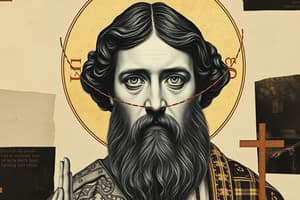Podcast
Questions and Answers
According to Socrates, what did he believe was the worst thing that could happen to anyone?
According to Socrates, what did he believe was the worst thing that could happen to anyone?
- Living without examining life (correct)
- Living without achieving material success
- Living without experiencing true happiness
- Living a meaningless life
In Socrates' dualism, which component of the self was considered perfect and permanent?
In Socrates' dualism, which component of the self was considered perfect and permanent?
- Material aspect
- Body
- Immaterial/immortal aspect
- Soul (correct)
According to Plato, which part of the self is in charge of emotions?
According to Plato, which part of the self is in charge of emotions?
- Body
- Appetitive Soul
- Spirited Soul (correct)
- Rational Soul
Which philosopher believed that the self is composed of the body, soul, and spirit?
Which philosopher believed that the self is composed of the body, soul, and spirit?
What did St. Augustine consider as the inner part of the self?
What did St. Augustine consider as the inner part of the self?
In Socrates' philosophy, what is the core idea behind 'an unexamined life is not worth living'?
In Socrates' philosophy, what is the core idea behind 'an unexamined life is not worth living'?
According to Merleau-Ponty, what does he believe about the mind-body relationship?
According to Merleau-Ponty, what does he believe about the mind-body relationship?
Which philosopher believed that the self is only a bundle of constantly changing perceptions?
Which philosopher believed that the self is only a bundle of constantly changing perceptions?
According to Descartes, what is the nature of the self?
According to Descartes, what is the nature of the self?
What did Locke believe about the nature of the self?
What did Locke believe about the nature of the self?
According to Ryle, how does he define the self?
According to Ryle, how does he define the self?
What did Kant believe about the nature of the self?
What did Kant believe about the nature of the self?
According to Thomas Aquinas, what does matter refer to?
According to Thomas Aquinas, what does matter refer to?
What does John Locke believe the human mind is at birth?
What does John Locke believe the human mind is at birth?
According to David Hume, what is the self?
According to David Hume, what is the self?
Emmanuel Kant suggested that our consciousness is formed by which two selves?
Emmanuel Kant suggested that our consciousness is formed by which two selves?
What is one way Gilbert Ryle defines the self?
What is one way Gilbert Ryle defines the self?
What concept is associated with Descartes' famous statement 'Cogito ergo sum'?
What concept is associated with Descartes' famous statement 'Cogito ergo sum'?
What does the text define as the self?
What does the text define as the self?
According to Stevens (1996), how does the self differ from others?
According to Stevens (1996), how does the self differ from others?
What is NOT a component of the self according to the text?
What is NOT a component of the self according to the text?
Why is it important to understand the self?
Why is it important to understand the self?
What is one of the objectives of the lesson mentioned in the text?
What is one of the objectives of the lesson mentioned in the text?
How does the text suggest individuals can better understand themselves?
How does the text suggest individuals can better understand themselves?
Flashcards are hidden until you start studying




